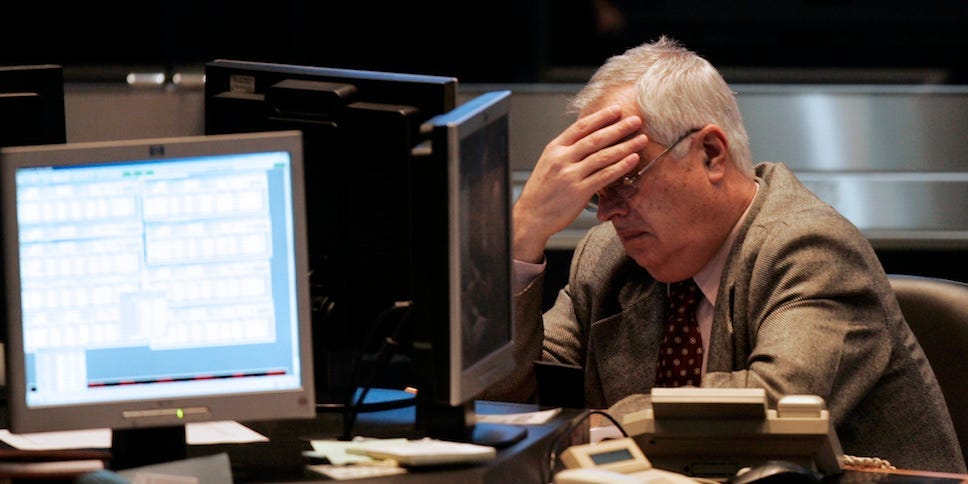- Investors are exuberant in anticipation of a Donald Trump presidency.
- However, Bob Elliott, founder of Unlimited Funds, sees plenty of reason for caution.
- Investors are misinterpreting the AI trade and other economic data, Elliott says.
There’s been a growing chorus of market experts warning that stocks are priced for perfection as investors cheer on AI developments and the prospect of a more business-friendly environment under the incoming Trump administration. Some have gone so far as to say that a pullback could be in the cards in the next few months.
Bob Elliott, founder of Unlimited Funds and a former executive at the hedge fund Bridgewater Associates, is the latest to voice his concerns about the market’s unbridled optimism.
Investors have baked the best-case scenario into prices already, according to Elliott. The market is pricing in forward earnings growth of 17% for the S&P 500, and GDP forecasts are 2.2% for 2025. For context, GDP expectations going into 2024 were barely above 1%.
Those high expectations could lead to disappointment, Elliott warned.
“What creates the ultimate adjustment in prices is when the data ends up being below what people expected,” Elliott told Business Insider in an interview.
With elevated earnings growth expectations and P/E ratios approaching levels that haven’t been seen since the dot-com bubble and market highs in 2021, Elliott believes the stock market is especially fragile.
Yardeni Research
“It wouldn’t take much normalization of P/Es to create a 20% decline in stocks in the near term,” Elliott said.
“We’re seeing misalignment between expectations, which are extraordinarily high, and the reality, which is not nearly as positive as those expectations. That’s the sort of thing that sets up corrections and will probably play out over the next three to six months,” he added.
Investors have the wrong idea about AI
AI has been a huge driver of frothy valuations in the stock market.
However, there’s a fundamental misconception about AI that investors are missing, according to Elliott: even if it does meet expectations, AI will hurt income growth and spending as it replaces jobs.
Much of the robust economic growth in recent years has been due to what Elliott calls the “income-driven cycle.” Americans have experienced annual income growth of around 5% in 2024, which Elliott says has fueled robust consumer spending and boosted the economy.
“The labor market really holds the key,” Elliott said of economic growth.
But AI poses a threat to this growth driver, according to Elliott. “The profit extrapolation that’s happening essentially is assuming that companies are going to experience a massive margin expansion as a result of AI,” Elliott said.
If companies boost productivity and lower costs by automating tasks through AI and employing fewer workers, the consumer activity that’s fueling economic growth could decrease sharply, Elliott believes.
“Investors extrapolate extreme things around company profitability without recognizing that if you fire 50% of your workforce, then those people don’t have the income necessary to spend,” Elliott said.
Essentially, Elliott believes if AI lives up to its hype, it could render large swaths of the labor market redundant — and tank economic growth in the process.
3 other signs of unsustainable valuations
AI hype isn’t the only signal of a stock market ungrounded in reality, according to Elliott.
For starters, the housing market is still in a tough spot. Housing construction, a leading indicator of economic momentum, has been on the decline for over a year. The dropoff starting in the second half of 2024 has been especially stark, Elliott pointed out.
Real-estate experts are hopeful that renewed optimism and deregulation could lead to an uptick in housing construction and inventory, which Elliott sees as another indicator of unrealistic investor expectations. A slowdown in housing construction often occurs before a broader economic softening, he added.
FRED
Business investment is also drying up as some of the pandemic-driven government spending slows down.
“Commercial structure investment which slowed years ago continues to reach new lows, and more notably, manufacturing-related investment which experienced CHIPS Act-related acceleration has also started to weaken. With these influences, business fixed investment in structure likely could create drag on GDP to kick off 2025,” Elliott wrote in a recent note.
Lastly, the labor market is challenged even without the widespread adoption of AI, Elliott said.
The share of prime-age workers, or people in the workforce between the ages of 25 and 54, also declined in the second half of 2024.
FRED
While Elliott doesn’t believe these indicators are signaling a full-blown recession in the future, investors should proceed with caution and avoid getting swept up in high expectations.
Elliott has seen investors get too cocky in a high-optimism environment and take unnecessary risks or trade excessively. He recommends investors avoid allocating money in reaction to news and stick with a well-defined portfolio strategy.
“Don’t get whipsawed by a particular thing going up or down because almost always, as an individual investor, you’ll end up making worse decisions if you follow the price too closely than if you stick to a game plan,” Elliott said.

